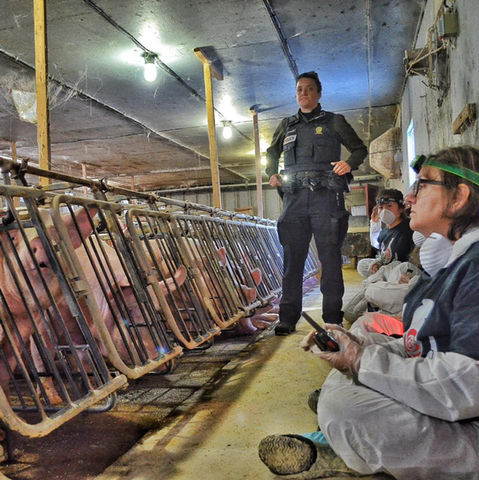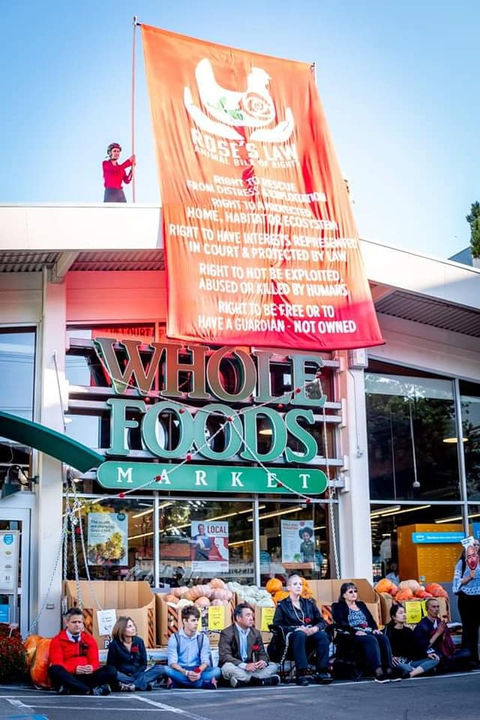
Add Your Name in Support of Rose’s Law: Animal Bill of Rights
Science tells us that animals are sentient, and justice demands that all sentient beings be protected from tyranny and oppression. For the past few centuries, we have been expanding our conception of who deserves our care, but we recognize that most animals still have no appropriate legal protections.
We call on leaders and groups around the world to support legislation or communal agreement giving all sentient animals:
-
The right to be free - not owned - or to have a guardian acting in their best interest.
-
The right to not be exploited, abused, or killed by humans.
-
The right to have their interests represented in court and protected by the law.
-
The right to a protected home, habitat, or ecosystem.
-
The right to be rescued from situations of distress and exploitation.
Everyone deserves these basic rights, including us humans, yet so few of us have them. Please sign and share as a first step towards fighting for a future where the most vulnerable among us are protected, instead of exploited or disregarded.
Learn more about the fight for the Right to Rescue in particular at righttorescue.com. The Animal Bill of Rights was inspired in part by, and stands in support of, much of the "Declaration of Animal Rights" from 2011.
WHAT WE ALL DESERVE
We all deserve the same basic rights as anyone else and Rose's Law seeks to use civil engagement and civil disobedience to help ensure that everyone, regardless of race, gender, ability, species, or anything else, is granted as much.
What does the actual bill say?
Science tells us that animals are sentient, and justice demands that all sentient beings be protected from tyranny and oppression. For the past few centuries, we have been expanding our conception of who deserves our care, but we recognize that most animals still have no appropriate legal protections.
We ask that you support legislation or communal agreement giving all sentient animals:
-
The right to be free - not owned - or to have a guardian acting in their best interest.
-
The right to not be exploited, abused, or killed by humans.
-
The right to have their interests represented in court and protected by the law.
-
The right to a protected home, habitat, or ecosystem.
-
The right to be rescued from situations of distress and exploitation.
Participating Cities
How can we make a Bill of Rights pass?



Press
If we can be on the cover of the New York Times for days in a row, this will become a national debate. Once the way we treat animals is described and examined, we know that truth will prevail.
Civil Disobedience
When society refuses to address an issue, nonviolent civil disobedience can be used to force a debate. By shutting down the normal functioning of society, you get a chance to be actually heard.
Lobbying or Creating
By asking politicians for legislative change, we can achieve victories that become the law. If politicians don't keep their promises, we go back to the streets. Alternatively, we can build new systems on local or broad levels that adopt Rose's Law.

Who was Rose?
Rose (pictured above) was a hen who was rescued in 2018 from an "organic," "free-range" farm supplying Perdue's Petaluma Poultry. Whistleblowers had found evidence of animal cruelty inside the farm, and alerted the authorities. After animal control and others refused to address the animal cruelty, activists decided the only recourse was to enter and help the neglected animals.
The police arrested 58 activists, and Animal Control removed 9 sick chickens. They promised the activists they would get the veterinary help they needed, but instead were killed that same day because it wasn't worth the money to help them.
However, the police allowed one activist holding one hen, Rose, to leave the property. We see this symbolic act of compassion as proof that the police that day knew that rescuing animals is not a crime.
Rose was the sole survivor that day, and her memory lives on as evidence that this atrocity isn't justified. It lives on as proof that that day even the police knew what was the right thing, and they decided to break the law by letting her go.
Rose's rescue was part of ongoing actions that have seen over 100 nonviolent activists arrested at factory farms in Sonoma County for taking nonviolent direct action to help suffering animals like Rose after the government ignored repeated reports of criminal animal cruelty. Six activists face a total of 47 felonies stemming from three actions at three different factory farms which occurred in May 2018, September 2018, and June 2019.
Rose passed away after over a year of being cared for by Zoe Rosenberg. Zoe is currently on trial for rescuing four other sick hens from Perdue's Petaluma Poultry in Petaluma, CA.
How can we transition?
Passing Rose’s Law: Animal Bill of Rights will require unprecedented change in our society. A large part of our economy is dependent on animal exploitation so many jobs will have to be replaced.
Recognizing that humans are also animals means they also need to be protected under Rose’s Law. This means that humans also deserve a right to a protected home or habitat. Unfortunately, many humans still lack houses and live on the street because of the failures of our systems.
To provide nonhumans with the protections they need, while also recognizing that many humans are dependent on income they receive from exploiting animals, we need a mindful transition to animal liberation.
What this means in practice, is that the governments, that have for a long time subsidized animal abusing industries, need to provide funds for humans to transition away from animal exploitation. It means no one should lose their livelihood or home in the process of society ending the animal exploitation industries.
We believe that governments need to set aside billions of dollars for farmers to transition to plant agriculture, for slaughterhouse workers that need job training, and any other person who’s been dependent on exploiting animals and is looking for a way out. In short, governments need to create millions of good, family-sustaining jobs for people who want to move away from animal exploiting industries.








